

kara
Faq - Dr Louise Porter. Tip Sheet - Sue Larkey. Home My Special Child. PracticePrinciplesPoster. Child Protection and Child Safe Standards (PROTECT) Willa: Hi, and welcome to “Protect.”
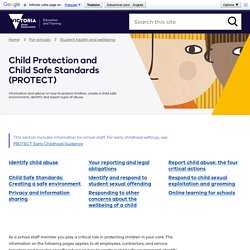
My name is Willa. Dane: And I’m Dane. Willa: We’re here to help you understand how to best Identify and Respond to All Forms of Child abuse within Victorian Schools. Dane: As a community we all have to work together to keep children safe and protect them from abuse. Willa: And as school staff members we all play an especially critical role in protecting the children in our care. We’re often best placed to identify signs and behaviours that may indicate that a child has been abused, or even that a school staff or community member is perpetrating abuse. Dane: We must act whenever we suspect that a child has been abused, or is at risk of abuse. Willa: Yes, even Principals, allied health staff and contractors. It includes details on: Understanding our obligationsSigns of Abuse Four Critical Actions- Responding to Suspected Abuse Reporting Concerns About the Wellbeing of a Child, and Sharing Information and Managing Privacy.
Veyldframework. Human resources: Department Values. Page Content Public education, early childhood development and training are critical public services and the jobs we do to provide high quality education services are very important.
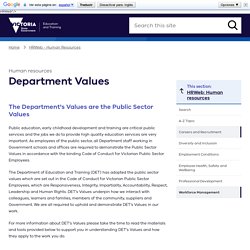
As employees of the public sector, all Department staff working in Government schools and offices are required to demonstrate the Public Sector Values in accordance with the binding Code of Conduct for Victorian Public Sector Employees. The Department of Education and Training (DET) has adopted the public sector values which are set out in the Code of Conduct for Victorian Public Sector Employees, which are Responsiveness, Integrity, Impartiality, Accountability, Respect, Leadership and Human Rights. DET’s Values underpin how we interact with colleagues, learners and families, members of the community, suppliers and Government. Framework for Improving Student Outcomes (FISO): Policy. Policy This policy sets out the requirement for schools to implement the Framework for Improving Student Outcomes.
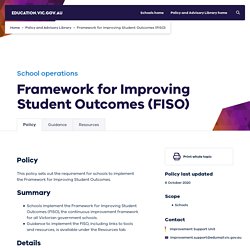
Summary Schools implement the Framework for Improving Student Outcomes (FISO), the continuous improvement framework for all Victorian government schools. Guidance to implement the FISO, including links to tools and resources, is available under the Resources tab. Details The FISO, a key Education State reform initiative, was introduced in 2015 for all Victorian government schools. The FISO encompasses three elements. The Model also includes the FISO Continua of Practice (the Continua) that supports schools to self-evaluate and sustain a climate of continuous improvement. The second element is the FISO Improvement Cycle, which supports schools to focus with greater precision on better outcomes for students by guiding schools through an effective inquiry process.
The Spoke – Early Childhood Australia's Blog - A voice for young children. Home - Be You. Unlimited Access to 40,000 of the Best Children's Books & Learning Videos. Home - Yarn Strong Sista - An Education Consultancy. Ways of teaching & engaging Aboriginal students. Tips for teaching Aboriginal students Many non-Aboriginal teachers do not have a lot of experience teaching and engaging Aboriginal children.
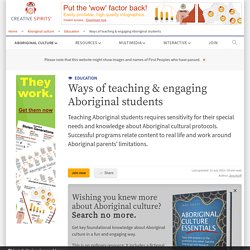
To reach them and get them interested in learning, you must sometimes leave behind the textbook solutions you studied. Know cultural needs Aboriginal students can avoid direct eye contact to an adult as it is considered rude in Aboriginal culture. When teachers misdiagnose Aboriginal students' classroom behaviour we can speak of 'soft racism'. Aboriginal children are also less likely to answer questions in the classroom because traditionally, Aboriginal culture has been passed on through the telling of stories; it's not about questions and answers or because they don't like to be the centre of attention. "I realise that many children might know the answer, but aren't comfortable speaking up. WILLUM WARRAIN HOME. Helping you learn and teach about Aboriginal culture.
Australian Teaching Resources for Primary Years - Crackerjack Education. AllPlay Learn – Making the world fit for all kids. Australian Teacher Aide. PROFESSIONAL DEVELOPMENT. Helping you develop your skills Semann & Slattery are professional development experts — especially for educational settings.
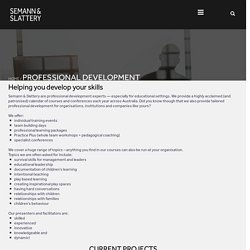
We provide a highly acclaimed (and patronised) calendar of courses and conferences each year across Australia. Did you know though that we also provide tailored professional development for organisations, institutions and companies like yours? We offer: individual training events team building days professional learning packages Practice Plus (whole team workshops + pedagogical coaching) specialist conferences We cover a huge range of topics – anything you find in our courses can also be run at your organisation.Topics we are often asked for include: survival skills for management and leaders educational leadership documentation of children’s learning intentional teaching play based learning creating inspirational play spaces having hard conversations.
Sue Larkey Elearning. Teachers and Trainers - deafConnectEd. SuccessSupportResources A photographic dark room.
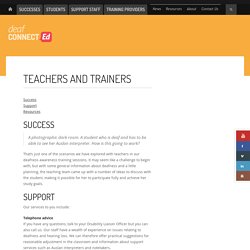
A student who is deaf and has to be able to see her Auslan interpreter. How is this going to work? That’s just one of the scenarios we have explored with teachers in our deafness awareness training sessions. It may seem like a challenge to begin with, but with some general information about deafness and a little planning, the teaching team came up with a number of ideas to discuss with the student, making it possible for her to participate fully and achieve her study goals. Our services to you include: Telephone advice If you have any questions, talk to your Disability Liaison Officer but you can also call us. Teachers.